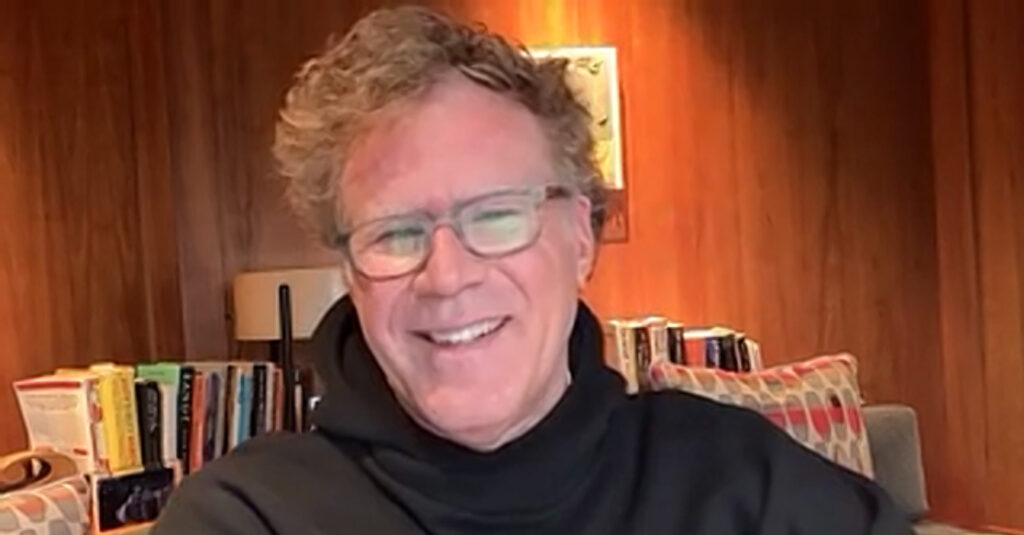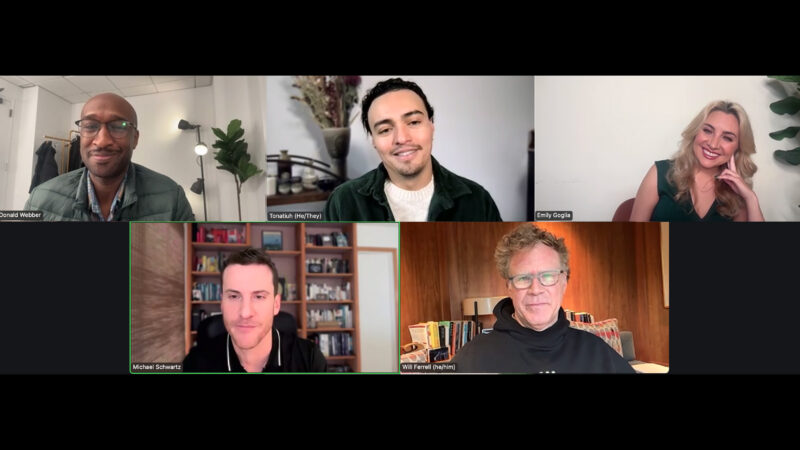From the box office success of Wicked to the critical acclaim of Emilia Perez, movie musicals are experiencing a renaissance—and USC alumni are leading the charge. Located in the heart of Los Angeles, the USC School of Dramatic Arts trains media-agile performers who move seamlessly between stage and screen, making it a natural launching pad for talent in this resurging genre. This connection was highlighted last month when a panel of Trojan alumni gathered virtually to share insights from the frontlines of movie musical performance.
The panel featured USC alumni and veterans of the stage and screen. Participants included comedy superstar Will Ferrell (’90) and musical theatre veterans Donald Webber Jr. (BFA ’08; The Wiz Live!, Severance), Tonatiuh (BA ’14; Kiss of the Spider Woman) and Emily Goglia (BM Music Industry with Jazz Vocal Emphasis ’10; Grease Live!, The Sing-Off). The panel was moderated by director and SDA alumnus Michael Schwartz (BA ’06), who has directed musicals for both the stage and screen.
“I think La La Land was a sea change, in the sense that it felt nostalgic and contemporary at the same time,” said Ferrell. “Personally, I think that re-opened the door for musicals to be viable again.”
Other panelists offered insights into why the genre has become so prominent in recent years.
“It’s accessible. You don’t need to get on a plane to New York or L.A. You can watch it from the comfort of your own home,” explained Webber.
Goglia, who has performed in a wide variety of ways for musicals on camera—from TV musicals like Grease Live to singing on the soundtrack of Wicked to performing her own skits on social media—credited an even simpler reason. “I think that everybody is secretly a musical theatre person,” she said. “I think that a lot of the people we love in Hollywood are theatre kids.”
The technical challenge of movie musicals
While movie musicals often feature extraordinary singing and dancing that look effortless, the panelists emphasized how a tremendous amount of work goes into creating that illusion—and performing musical theatre in front of a camera presents its own unique challenges.
“Performing in movie musicals seems to be so technical,” Schwartz commented. “There’s a real precision… that is required.”
Tonatiuh, who stars opposite Jennifer Lopez in the new film Kiss of the Spider Woman that debuted at Sundance this year, agreed.
“Keeping it fresh. Keeping your emotional instruments still there. And making sure that you’re looking at the right part of the mirror, that the camera is picking up on this side at every single moment without a mark is a bit of a challenge,” he said.
Movie musicals also feature over-the-top worlds and exaggerated characters, which can present their own challenges to actors—particularly on film, where the camera makes everything bigger. But Webber encouraged young actors to embrace the challenge and inject their performances with something true to the world of the film. “If everyone says this is the world, then this is the world,” Webber explained. “I would challenge the actor to say: ‘This isn’t over the top. This is who I am.’

Aided by top-tier training
The panelists discussed how their training at USC prepared them for the challenging demands of movie musicals. Tonatiuh tapped into his time performing with USC’s repertory dance company in Kiss of the Spider Woman, and Goglia drew on her choral experience at USC to sightread music for the Wicked soundtrack. Webber, who is currently appearing on Broadway with Bob Odenkirk and comedian Bill Burr in Glengarry Glen Ross, noted that he still uses vocal warmups taught by SDA faculty before every show.
“I still think about Natsuko Ohama, who was my voice teacher. I think about Paul Backer,” Webber said. “I’m still doing the same warmups today… Honestly, it just helps my mind to focus on being present.”
Ferrell, who performed in his first movie musical portraying Franz Liebkind in 2005’s film adaptation of The Producers, has since gone on to star in other movie musicals like Eurovision Song Contest and Spirited. Though not trained specifically in musical theatre, Ferrell, whose father was a professional musician, has long incorporated music into his comedy, including several memorable skits on Saturday Night Live.
“I grew up around music. My dad’s a musician. I saw him perform in every venue, from night clubs to big stages to touring shows in Las Vegas. I was around it,” he said. “Even when I started at the Groundlings here in L.A., I would find myself incorporating music any way I could—probably subconsciously.”
Looking to the future
Students will have the opportunity to delve deeper into the wonderful world of movie musicals this fall thanks to a course, taught by SDA Professors Rena M. Heinrich and Scott Faris, that explores both stage-to-screen adaptations and original film productions, and examines how composers, directors and performers collaborate to create theatrical magic onscreen. Schwartz paused to point out the wealth of experience on display—ranging from musical comedy, to original and adapted movie musicals, to TV and soundtrack work—and encouraged students watching to take note of the expertise available through such events.
“These are real-world examples of what happens when you get to a studio session, like Emily, or like Will, if you’re singing in advance—how do you match that?,” he emphasized. “These are real examples that I love to hear.”
It seems certain that movie musicals will continue to play a major role in Hollywood in the coming years, and while many productions involve the adaptation of classic material, the panelists encouraged USC students interested in musical theatre to continue pushing the boundaries of the genre.
“I just want new works,” said Goglia. “I feel there is a lot of recycling of things we already know and that people are playing it very safe.”
“A lot of the fresh stuff I found was people who loved it and uploaded fresh stuff on YouTube,” added Tonatiuh, speaking directly to the students. “If you have composer friends and lyricist friends and you’re a performer, throw it online. Put it on TikTok, put it on whatever. It will find its audience.”
Ferrell agreed. “The genre is so unique. Everyone should continue to use that potential to test what it is and what it can be,” he said. “We watch a new musical, and we think, ‘How did they think of that?’ But it’s just someone going, ‘How can I do this differently?’ And I think there are still a million ideas out there that we haven’t discovered.”
